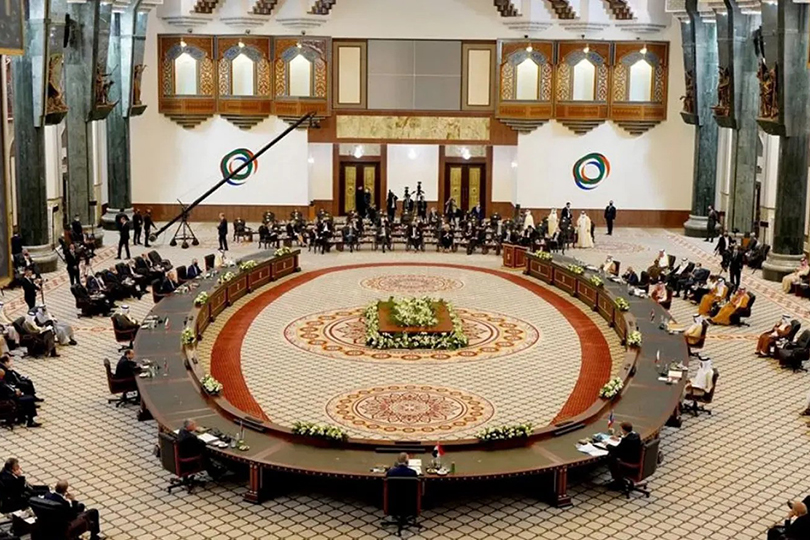By Ibrahim Al-Abbadi
Since the launch of Arab summit diplomacy in 1964, dozens of summits—regular and extraordinary—have been held, with the Palestinian cause and the Arab-Israeli conflict dominating their agendas. Now, six decades later, the summit returns to Baghdad, while the plight of the Palestinian people continues to weigh heavily on the Arab public's conscience. For more than 18 months, dozens have been killed daily, the death toll exceeding 50,000, with more than double that number injured. Gaza has been virtually erased, as Arab, Muslim, and international efforts fail to curb Israeli aggression or stop its policies of extermination and destruction.
The Palestinian issue will certainly feature prominently at the summit. However, ambitions have been reduced to merely trying to prevent the mass displacement of Gaza’s residents, seeking a ceasefire, and convincing U.S. President Donald Trump to support the reconstruction of Gaza without displacing its inhabitants or placing the territory under direct American administration.
Trump, known for his “outside-the-box” proposals, previously suggested that the United States should acquire Gaza and transform it into a “Middle Eastern Riviera” to attract the wealthy and leisure seekers. Meanwhile, elements of the Israeli right have pushed for the voluntary migration of Palestinians and the imposition of direct Israeli military control over the Gaza Strip.
Ahead of the summit, Trump is embarking on a Gulf tour that includes Saudi Arabia, Qatar, and the UAE, deliberately avoiding a visit to Israel—perhaps to maintain a calculated distance from the agenda of Israeli Prime Minister Benjamin Netanyahu. Netanyahu seeks to redraw the Middle East map through an aggressive strategy of preempting threats, forcing negotiations, and imposing normalization by force—where refusal results in destruction, sabotage, and the failure of stabilization efforts.
Against this backdrop, Damascus—now led by an Islamist-leaning government under Ahmed Al-Shar’a—finds itself compelled to engage in negotiations with Israel. This comes amid daily attacks and competing regional agendas, particularly Turkish and Israeli. The UAE has stepped in as a mediator, filling a role traditionally played by Arab heavyweights like Egypt.
Meanwhile, Lebanon grapples with compounded crises hindering reconstruction and stability. Israel exerts political and military pressure, aiming to remove Hezbollah from the security equation and fully disarm the group—not just south of the Litani River, but across the entire country.
As for the broader Arab world, leaders gather in Baghdad while joint Arab action is at its weakest in terms of influence and effectiveness. The pressing question remains: what can this summit achieve in a reality where the concept of Arab national security has eroded, replaced by narrow national interests and unilateral sovereignty?
Hopes for a unified Arab stance capable of shifting power dynamics have dwindled as pan-Arab visions and institutions have withered. Yet, there remains an opportunity to work on shared interests—political, economic, and security-related—tailored to each country's weight, paving the way for gradual Arab understandings, similar to the European Union’s model.
Success in this path requires an integrative, long-term approach, recognizing that it may take years for visions to mature and policies to align. Summit diplomacy must transcend the stagnation of the Arab League and its decaying institutions. The need now is not for recycled slogans, but for a comprehensive reassessment of joint Arab action, rethinking mechanisms in light of new challenges.
Iraq’s Foreign Ministry could take the lead by presenting a critical and realistic assessment of Arab cooperation in the first quarter of the 21st century, comparing it to achievements since the Arab League's establishment. This could lay the groundwork for an initiative to restructure joint Arab action under the banner of a "Baghdad Declaration," acknowledging that what worked decades ago is no longer sufficient today.
As for Trump’s anticipated visit—his first overseas trip in his second term—it clearly reflects his priorities: economy, finance, investment, and political engineering of the region. The United States no longer seeks to lead by paying the cost but is pushing a new equation: alliances in exchange for money, security in return for allies’ spending—not from Washington’s coffers.
Trump brings a markedly different vision from traditional American policy. He rejects costly interventions and funding for democratization and human rights promotion, focusing instead on “strategic bartering” to achieve U.S. goals: security for money, peace for economic interests, scientific and technological superiority for conditional recognition of American primacy.
This approach is increasingly accepted by many global and regional leaders, particularly in our crisis-ridden and problem-laden region.
The Baghdad Summit could become a turning point—if it manages to spark a new Arab mindset that responds to global changes with realism, rather than reactive anger or worn-out rhetoric.






Comments